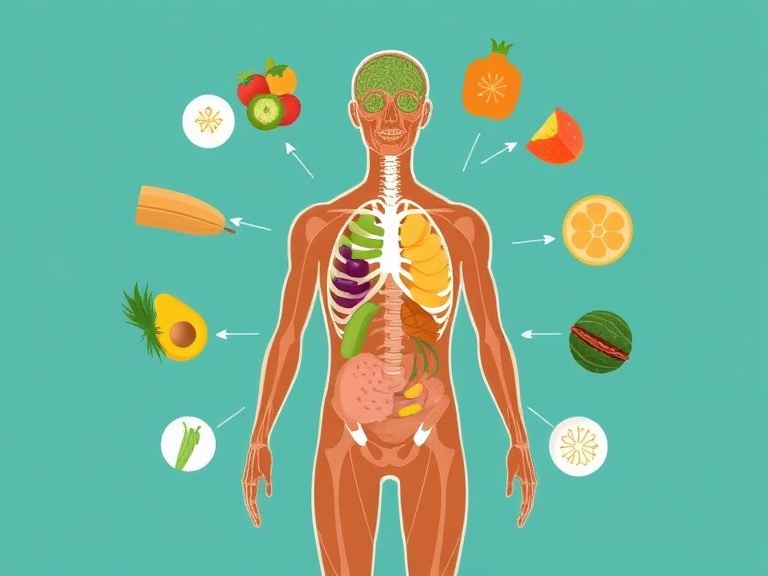What Are Carbohydrates?
Carbohydrates, often called carbs, are one of the three primary macronutrients essential to human health, alongside proteins and fats. They are organic compounds composed of carbon, hydrogen, and oxygen, and they serve as the body’s primary energy source. Found in foods like grains, fruits, vegetables, and dairy, carbohydrates are classified into two main types: simple (sugars) and complex (starches and fibers).
Why Do Many People Cut Carbohydrates for Weight Loss?
The idea of cutting carbohydrates stems from popular diet trends, such as ketogenic or low-carb diets, which emphasize carbohydrate restriction to accelerate fat burning. Many believe that since carbs can spike blood sugar and insulin levels, reducing them may help the body shift to burning fat for energy. However, this approach often oversimplifies the role of carbohydrates and overlooks the potential consequences of complete carb elimination.
Goal of This Article
This article aims to address whether completely eliminating carbohydrates is necessary or even beneficial for weight loss. We will explore the scientific role of carbohydrates, weigh the pros and cons of their reduction, and provide practical advice for those looking to manage their carbohydrate intake effectively.
The Role of Carbohydrates in the Body

Carbohydrates as the Body’s Primary Energy Source
When consumed, carbohydrates are broken down into glucose, which fuels the body’s cells. The brain, in particular, depends heavily on glucose to function optimally. Excess glucose is stored as glycogen in the liver and muscles, serving as a readily available energy reserve.
Scientific Evidence:
A study published in the Journal of Clinical Endocrinology & Metabolism found that glycogen stores are vital for maintaining energy levels during moderate-to-high-intensity exercise. Participants on low-carb diets reported fatigue and reduced performance, underscoring the importance of carbohydrates for physical activity.
Additional Functions of Carbohydrates
- Digestive Health: Complex carbohydrates, such as those found in whole grains, contain dietary fiber that promotes gut health and prevents constipation.
- Brain Function: The brain requires approximately 120 grams of glucose daily to maintain focus and cognitive function.
- Metabolic Regulation: Carbohydrates regulate hormones like insulin, which helps balance blood sugar levels.
Types of Carbohydrates
- Simple Carbohydrates: Found in sugary drinks, candies, and white bread, they are rapidly digested and cause quick spikes in blood sugar.
- Complex Carbohydrates: Found in whole grains, legumes, and vegetables, they digest slowly, providing sustained energy and aiding in satiety.
Example:
White rice, a simple carbohydrate, is digested quickly and may cause energy crashes. In contrast, brown rice, a complex carbohydrate, offers a steadier release of energy and includes more nutrients like fiber and magnesium.
Pros and Cons of Cutting Carbohydrates
Pros of Reducing Carbohydrates
- Calorie Reduction: Lowering carb intake often reduces overall calorie consumption, which is essential for weight loss.
- Improved Blood Sugar Control: For individuals with insulin resistance or type 2 diabetes, reducing simple carbohydrates can stabilize blood sugar levels.
- Short-Term Weight Loss: Many experience rapid initial weight loss due to water weight depletion from glycogen stores.
Cons of Cutting Carbohydrates
Cutting carbohydrates from your diet can lead to a variety of changes, both physically and mentally. For many, this decision stems from the desire to lose weight, control blood sugar levels, or improve overall health. The journey begins with a significant dietary shift—one that often feels both liberating and daunting.
As you reduce your carbohydrate intake, your body begins to adapt to a new source of energy. Carbohydrates are typically the body’s primary fuel, so when they are cut back, the body starts to seek alternative sources. This process leads many to enter a state known as ketosis, where fat becomes the main energy source. For some, this transition happens quickly, resulting in rapid weight loss, but for others, it can take time and might come with initial discomfort. Symptoms often referred to as the “keto flu” may emerge—fatigue, irritability, headache, and cravings may dominate the first few days.
Alongside these physical changes, cutting carbs can significantly impact your mental state. Some report enhanced focus and mental clarity once they have adapted to their new diet, as stable blood sugar levels foster improved concentration and reduced brain fog. However, the initial phase can also be challenging psychologically. Cravings for sugary treats and starchy foods can lead to feelings of deprivation, making it crucial to find satisfying alternatives that do not derail your progress.
The elimination of high-carbohydrate foods often leads to an increased intake of proteins and fats. This shift can yield positive results—higher satiety levels may result from eating more nourishing foods, leading to smaller portions and, ultimately, weight loss. Furthermore, some individuals find that their cravings for processed foods diminish, allowing them to rediscover whole, nutrient-dense options.
On a broader scale, cutting carbohydrates can resonate through various aspects of health. Many people notice improvements in inflammation, digestion, and energy levels once the initial adaptation period is over. However, it’s important to approach this dietary change with caution. Not all carbohydrates are created equal; whole grains, fruits, and legumes provide essential nutrients that should not be neglected in the pursuit of lower carbohydrate intake.
The key lies in balance and mindfulness. A sustainable approach to cutting carbohydrates involves choices that nourish both body and spirit. Listening to your body, understanding its signals, and allowing flexibility can help you navigate this journey successfully. Ultimately, cutting carbohydrates can be a transformative experience, paving the way for healthier habits, better energy levels, and perhaps even a newfound appreciation for the diverse array of food available beyond the starchy staples.
Scientific Evidence:
A 2018 study in the American Journal of Clinical Nutrition revealed that individuals on low-carb diets experienced higher cortisol levels, indicating stress, compared to those consuming balanced diets. Long-term stress can hinder weight loss and overall well-being.
When discussing the effects of cutting carbohydrates, it’s essential to ground the conversation in scientific evidence gathered from numerous studies and clinical trials. Here’s an overview of key research findings on low-carbohydrate diets, their effectiveness, and their potential impacts on health.
1. Weight Loss and Body Composition

Several studies have demonstrated that low-carbohydrate diets can lead to significant weight loss. A systematic review published in The American Journal of Clinical Nutrition (2014) examined the effects of low-carbohydrate versus low-fat diets. The review noted that individuals on low-carbohydrate diets had greater weight loss at both six months and twelve months compared to those on low-fat diets.
2. Ketosis and Fat Utilization
When carbohydrates are restricted, the body shifts to ketosis—a metabolic state where fats are broken down for energy. Research has shown that entering ketosis can effectively aid in fat loss. A study published in Nutrition & Metabolism (2010) found that individuals following a ketogenic diet had significantly increased fatty acid oxidation compared to those on a standard diet.
3. Effects on Blood Sugar and Insulin Levels

Low-carbohydrate diets also have a profound effect on blood sugar and insulin levels. A meta-analysis in Diabetes Care (2015) found that low-carbohydrate diets led to greater improvements in HbA1c (a marker of blood sugar levels) and insulin sensitivity in individuals with type 2 diabetes compared to low-fat diets.
4. Lipid Profiles
The impact of low-carbohydrate diets on cholesterol and triglyceride levels has also been studied extensively. A review in Current Atherosclerosis Reports (2018) noted that low-carbohydrate diets often lead to increased levels of high-density lipoprotein (HDL) cholesterol and reduced levels of triglycerides, both of which are beneficial for cardiovascular health. However, concerns remain regarding the potential rise of low-density lipoprotein (LDL) cholesterol in some individuals.
5. Appetite Regulation

Several studies suggest that low carbohydrate diets can reduce hunger and promote satiety. The Journal of Nutrition published a study in 2015 showing that participants on a low-carbohydrate diet reported higher levels of fullness and reduced overall calorie intake compared to those on a higher carbohydrate diet.
6. Long-Term Sustainability
While short-term effectiveness is often documented, the long-term sustainability of low-carbohydrate diets is a subject of debate. A study published in Obesity Reviews (2018) highlighted that while many individuals experience initial success, maintaining a low-carb regimen can be challenging over time due to dietary restrictions and social pressures.
7. Psychological Effects

The psychological effects of significantly reducing carbohydrate intake have also been explored. A study published in Appetite (2016) noted that while some individuals may experience reduced cravings and improved mood stabilization, others may struggle with feelings of deprivation, leading to binge eating or rebound weight gain.
A Scientific Approach to Carbohydrates in Weight Loss

Carbohydrates Are Not the Enemy
Eliminating carbohydrates completely is neither necessary nor advisable. Instead, focusing on the quality of carbohydrates can yield better results without compromising health.
Prioritize Complex Carbohydrates
Foods like quinoa, oatmeal, sweet potatoes, and legumes provide fiber, vitamins, and minerals. These not only aid weight loss by improving satiety but also support long-term health.
Example:
Pairing sweet potatoes with grilled chicken and steamed broccoli offers a balanced meal rich in nutrients, fiber, and protein.
Combine Carbohydrates with Other Nutrients

Including proteins and healthy fats alongside carbohydrates can slow digestion and reduce blood sugar spikes. For example, a breakfast of oatmeal topped with almond butter and berries is balanced and energizing.
Adjust Intake Based on Individual Needs
Daily carbohydrate needs vary based on activity level, age, and health goals. Athletes may require higher carb intake, while sedentary individuals can thrive on moderate amounts. Consulting a nutritionist can help determine the ideal balance.
Practical Examples and Advice
Sample Menu for Balanced Weight Loss
- Breakfast: Overnight oats with chia seeds, almond milk, and fresh berries.
- Lunch: Brown rice bowl with grilled salmon, avocado, and steamed vegetables.
- Dinner: Quinoa salad with roasted chicken, kale, and a lemon vinaigrette.
- Snacks: A handful of nuts or a piece of fruit like an apple.
If you’re considering cutting back on carbohydrates, it’s helpful to have practical examples and tailored advice to guide you through the process. Here are some effective strategies, meal ideas, and tips to help you successfully navigate a lower-carbohydrate diet.
Examples of Low-Carbohydrate Foods
- Proteins:
- Meat: Chicken, beef, pork, turkey, and lamb.
- Fish: Salmon, trout, mackerel, and sardines.
- Eggs: Whole eggs are nutrient-dense and versatile.
- Plant-Based Proteins: Tofu, tempeh, and legumes (in moderation).
- Healthy Fats:
- Oils: Olive oil, avocado oil, coconut oil.
- Nuts and Seeds: Almonds, walnuts, chia seeds, flaxseeds.
- Avocados: Rich in healthy fats, fiber, and important nutrients.
- Full-Fat Dairy: Cheese, butter, heavy cream, and Greek yogurt (unsweetened).
- Non-Starchy Vegetables:
- Leafy Greens: Spinach, kale, and arugula.
- Cruciferous Vegetables: Broccoli, cauliflower, and Brussels sprouts.
- Other Vegetables: Bell peppers, zucchini, asparagus, and mushrooms.
- Low-Carbohydrate Snacks:
- Vegetable Sticks: Celery, cucumbers, and bell peppers with hummus or guacamole.
- Nuts and Seeds: A small handful for a quick snack.
- Cheese Slices: Pair with olives or nuts.
- Hard-Boiled Eggs: Easy to prepare in advance.
Meal Ideas
- Breakfast:
- Omelette: Made with spinach, bell peppers, and cheese.
- Greek Yogurt Bowl: Unsweetened Greek yogurt topped with nuts and a few berries.
- Chia Pudding: Chia seeds soaked in almond milk, topped with a few berries.

- Lunch:
- Salad: Mixed greens with grilled chicken, avocado, nuts, and olive oil dressing.
- Zucchini Noodles: Tossed with marinara sauce and meatballs.
- Lettuce Wraps: Use large lettuce leaves to wrap grilled meats and vegetables.

- Dinner:
- Grilled Salmon: Served with a side of roasted broccoli and garlic.
- Stuffed Bell Peppers: Filled with ground meat, cheese, and herbs.
- Cauliflower Rice Stir-Fry: Sauté cauliflower rice with vegetables and your choice of protein.

- Dessert:
- Low-Carb Cheesecake: Use almond flour for the crust and sugar substitutes if desired.
- Avocado Chocolate Mousse: Blend avocado with cocoa powder and a low-calorie sweetener.
- Fat Bombs: Made with coconut oil, nut butter, and cocoa—in small, satisfying portions.

Tips for Success
- Plan and Prepare: Create a meal plan for the week, including grocery lists and batch cooking meals in advance. This helps mitigate spontaneous carb-heavy choices.
- Stay Hydrated: Drink plenty of water, as lower carbohydrate intake can lead to quicker dehydration. Consider electrolyte supplementation if you experience symptoms like fatigue or headaches.
- Increase Fiber Intake: Ensure you’re including non-starchy vegetables and healthy fats to maintain digestive health and satiety.
- Listen to Your Body: Pay attention to hunger and energy levels. If you feel fatigued, reassess your carb intake, as some individuals may require more carbs for optimal energy.
- Choose Quality Carbohydrates When Allowing Some: If you include any carbs, opt for whole grains, legumes, and high-fiber fruits. Avoid processed and refined carbohydrates.
- Consult Professionals: If unsure about dietary choices, consult a registered dietitian or nutritionist to create a personalized plan based on your health goals.
- Be Mindful and Flexible: Allow for occasional treats or higher-carb days to prevent feelings of deprivation. The goal is long-term sustainability rather than perfection.
Tips for Lower Glycemic Impact
- Cook and cool rice before consuming, as this increases resistant starch, which reduces blood sugar response.
- Include leafy greens and high-fiber vegetables in meals to slow carb absorption.
Expert Advice
Registered dietitians recommend a “plate method” for portion control: fill half the plate with vegetables, a quarter with lean protein, and a quarter with whole grains or starchy vegetables.
Key Takeaways
- Carbohydrates are essential for energy, brain function, and digestive health.
- Reducing, not eliminating, carbohydrates—especially simple carbs—can aid weight loss.
- Choosing high-quality, complex carbohydrates supports a balanced diet and sustainable health.
Final Advice
Rather than adopting extreme measures, aim for a balanced approach that prioritizes nutrient-dense foods. Consulting with a healthcare professional or dietitian ensures a personalized plan that aligns with your goals and lifestyle.



